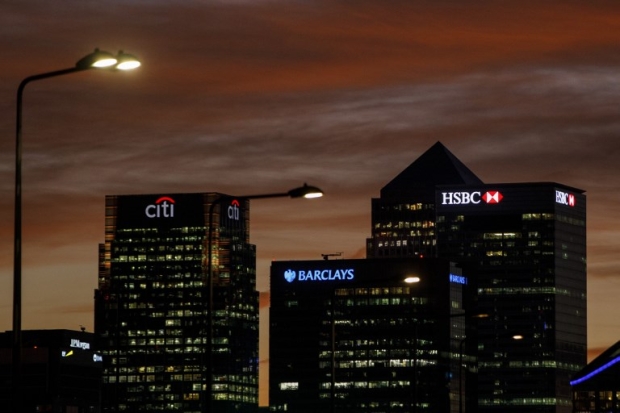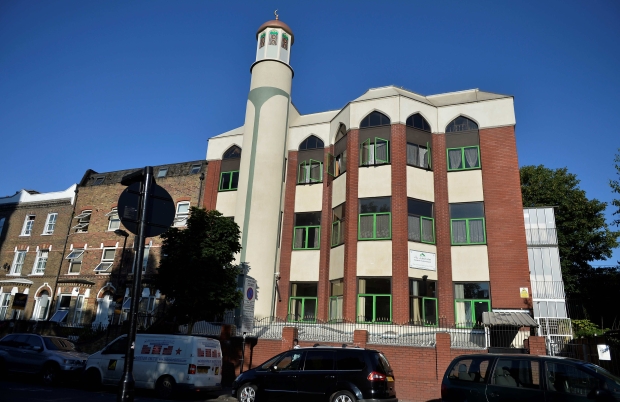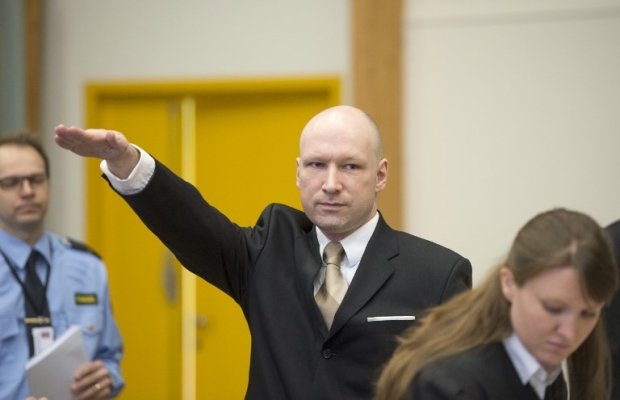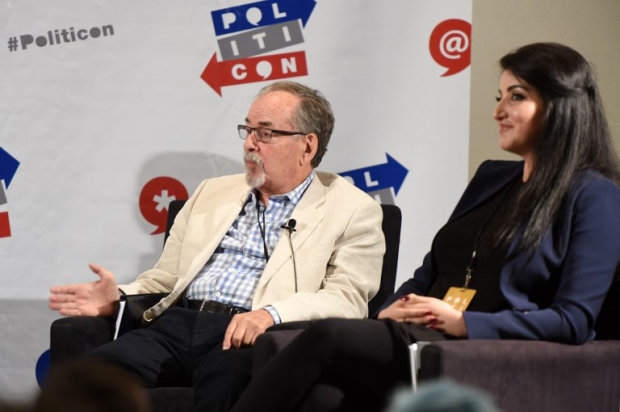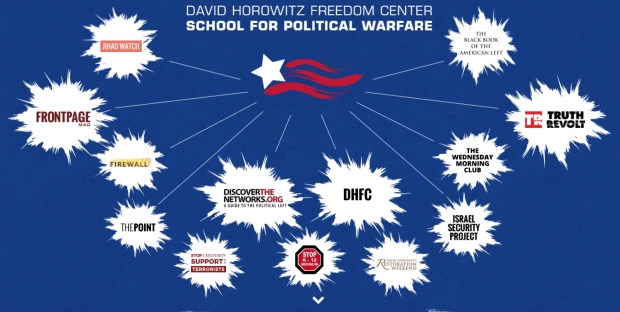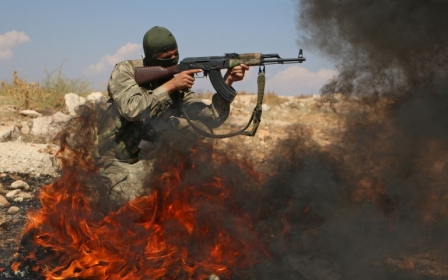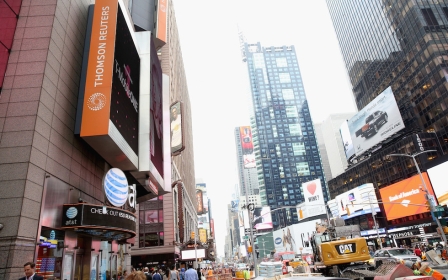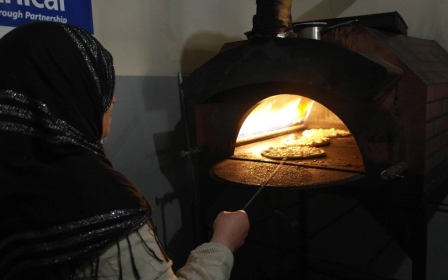'Terrorism' database cites 'Islamophobic' sources in Muslim profiles
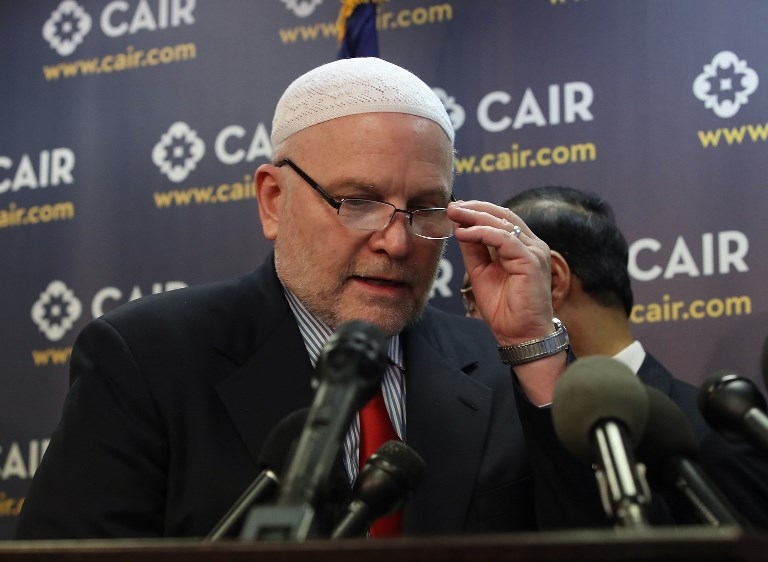
A leading financial risk database that is already facing multiple lawsuits from Muslim organisations which it suggested had links to terrorism is still using as sources websites accused of promoting far-right and Islamophobic agendas, Middle East Eye can reveal.
An MEE investigation has found several entries for prominent Muslim individuals and organisations in the World-Check risk intelligence database that include links to material posted on notorious websites such as Jihad Watch and Frontpage Magazine.
Some of the sources, including controversial US-based think tanks such as the Gatestone Institute and the David Horowitz Freedom Center, were also reported by the Guardian newspaper last week to be part of a "hidden global network" supporting Tommy Robinson, a far-right anti-Muslim activist in the UK.
Several are also cited in the militant far-right manifesto of Anders Breivik, who killed 77 people in a mass shooting at a youth camp and a car bombing in Norway in July 2011.
MEE also discovered that several reputable organisations, including the Council of American-Islamic Relations (CAIR), the most prominent Muslim rights group in the US, and Muslim Aid, a large British charity, continue to be categorised under "terrorism" on World-Check.
It was sold to media giant Thomson Reuters in 2011. In October, 55 per cent of Thomson Reuters' risk arm, made up of World-Check and a handful of other services, was sold to the investment giant Blackstone and rebranded Refinitiv.
World-Check has been under scrutiny since 2014, when several Muslim organisations and individuals in the UK said that their bank accounts had been closed at short notice.
Subsequent investigations revealed that some of them had been wrongly listed on the database under the category "terrorism".
Landmark libel case
Last February, the Finsbury Park Mosque in north London, one of the institutions affected by the bank account closures, won a landmark libel case against Thomson Reuters.
World-Check's entry on Finsbury Park Mosque was based on its former association with Abu Hamza al-Masri, the Egyptian cleric and former militant who was jailed for life in 2016 in the US on terrorism charges.
It failed to properly acknowledge that the mosque had been taken over by new management more than a decade ago and since been recognised for its community outreach work.
But Mohammed Kozbar, general secretary of Finsbury Park Mosque, said it was still encountering problems because of its World-Check listing and had been refused requests to open bank accounts even since the libel ruling.
Kozbar told MEE that losing your bank account is "like having your water cut off".
World-Check did not remove Finsbury Park Mosque from the database altogether, instead listing it as an "organisation" of heightened risk.
When MEE examined the mosque's current profile on World-Check, it found a link to the website of the Gatestone Institute, a US think tank which has been accused of publishing false and misleading stories about Muslims.
In regular articles it describes what it calls the "Islamization" of the West. Gatestone was one of the sources of the myth, for example, that there are Muslim "no-go zones" in Birmingham and other European cities.
They have to be regulated like the credit rating agencies. The Information Commissioner's Office absolutely has to step in
- Ben Hayes, an independent consultant
The Gatestone Institute denies being anti-Muslim and says that it is "pro-Muslim". It says that many of its contributors are Muslim and describes itself as an important platform for "Muslim reformers".
The Gatestone article listed on Finsbury Park Mosque's World-Check profile is by Samuel Westrop, the founder of a self-proclaimed counter-extremism website, Stand for Peace.
[Editor's note: The Gatestone article also mentioned one of the co-authors of this article, Peter Oborne, whom it described as a "supporter of the Muslim Brotherhood". Peter Oborne denies this allegation.]
Stand for Peace closed in June 2017 after it was ordered to pay £140,000 ($178,500) in damages to the founder of the Islam Channel for falsely calling him a "convicted terrorist".
The Finsbury Park Mosque profile also cites media sources such as the BBC and the New York Times. It contains a description of the mosque's takeover and the fact that it has repeatedly condemned terror attacks.
Addressing the libel defeat, the profile says: "We regret if any subscribers understood the terrorism categorisation as an accusation of present-day or suspected connections to terrorism. This was not our intention, and any such suggestion has been withdrawn."
Since the Finsbury Park Mosque case, Thomson Reuters and now Refinitiv have faced a wave of libel cases from Muslim organisations and individuals.
MEE can reveal that Farooq Bajwa & Co, the London law firm that represented Finsbury Park Mosque, has already completed eight cases and is working on a further 27.
Thomson Reuters was last year forced to apologise and pay damages to Maajid Nawaz, the founder of Quilliam, a counter-extremism think tank, whose World-Check profile cited sources referencing his past membership of Islamist organisation Hizb ut-Tahrir.
World-Check also removed the prominent British activist group the Palestine Solidarity Campaign from the database after it took legal action.
In March this year, the Palestinian Return Centre, another high-profile British charity, filed a claim against Thomson Reuters.
'Credible and reputable information'
The database cites thousands of sources, including UK and US government declarations and authoritative media agencies such as the BBC and CNN.
The Refinitiv website says: "We maintain a responsible, proportionate ethical approach - only using credible and reputable open source information."
It adds: "We follow the most stringent guidelines for research methodology and inclusion criteria – applying rigorous quality control."
But it also cites less credible sources: MEE has found 23 such examples, of which 12, which are all included in profiles of Muslim organisations and individuals, have been accused of Islamophobia.
Four – the David Horowitz Freedom Center, Jihad Watch, the Middle East Forum and Militant Islam Monitor – are listed in a 2016 report by the University of California, Berkeley, as among the "inner core" of the so-called "Islamophobia network".
The report says the primary purpose of these groups is to "promote prejudice against or hatred of Islam and Muslims" and says between 2008 and 2013 they had access to almost $206m in funding.
One of those cited several times on World-Check is Daniel Pipes, the controversial US historian of the Middle East and founder of the Middle East Forum think tank. Pipes, like the Gatestone Institute, for which he occasionally writes, argues that Muslims are destroying Western civilisation.
World-Check also cites the various projects of another notorious US think tank, the California-based David Horowitz Freedom Center.
The David Horowitz Freedom Center describes itself as a "school of political warfare" and refers to Islam and leftism being bound in an "unholy alliance against Israel, America, and the West".
Horowitz, its founder, is described as "the godfather of the modern anti-Muslim movement" by the Southern Poverty Law Center, an American civil rights group that works with the FBI to fight hate crime.
He also runs FrontPage Magazine, which the centre-left Center for American Progress has named as a key actor in fomenting anti-Muslim sentiment in the US.
FrontPage publishes work by Pipes, Horowitz himself, alleged conspiracy theorist Frank Gaffney, and Robert Spencer, who in 2013 was banned - alongside his co-blogger Pamela Geller - from entering the UK to speak at a far-right English Defence League rally.
CAIR and Muslim Aid listed under 'terrorism'
MEE's investigation discovered that World-Check included material from FrontPage in its profiles of both CAIR and Muslim Aid.
World-Check's profile of CAIR listed a 2004 article for FrontPage by David Frum, a former speechwriter to president George W Bush, alleging links between CAIR and Hamas.
Since MEE flagged the source with World-Check in July, it has been removed from the profile, along with all the other media sources previously cited, such as Fox News and the conservative Washington Times.
A spokesperson for World-Check said it had not made any changes to its reports since MEE flagged the sources.
World-Check's CAIR profile notes that it is listed as a terrorist organisation by the United Arab Emirates. The UAE has been accused by Amnesty International of using anti-terrorism laws to "arbitrarily restrict freedoms of expression and association".
In 2007, CAIR was listed along with more than 300 other Muslim organisations as an unindicted co-conspirator in the US trial of the Holy Land Foundation for Relief and Development (HLF), which was found guilty of funnelling money to Hamas.
The US State Department subsequently confirmed it did not consider CAIR to be a terrorist organisation.
Reference to the HLF trial has also been removed since MEE raised the profile with World-Check.
Added to the profile is a "Terrorism Category Notice" that explains: "Inclusion in the category does not mean that an individual or entity is a terrorist or terrorist organisation or that they have any involvement in or connection to terrorism ... you should review the content carefully".
These sources read like a who's who of the Islamophobia industry in America, promoting on a daily basis anti-Muslim bigotry
- Ibrahim Hooper, communications director of CAIR
Ibrahim Hooper, communications director of CAIR, said: "These sources read like a who's who of the Islamophobia industry in America, promoting on a daily basis anti-Muslim bigotry.
"And if these are the sources, World-Check would inevitably be skewed."
World-Check also lists Muslim Aid under "terrorism," noting that it is designated as a terrorist organisation by the Israeli defence ministry.
Israel accuses the charity of funding groups linked to Hamas. But Muslim Aid denies these allegations. In 2010 the Charity Commission, which regulates charities in the UK, said there was no evidence it was involved in the funding of terrorism.
World-Check cited a FrontPage Magazine article, the link to which has broken since MEE saw it, accusing Muslim Aid of funnelling money to terror organisations in Bangladesh.
It also cited a 2004 article on a website called Militant Islam Monitor which alleged that the "Muslim Aid 'charity' funds al-Qaeda".
MEE was unable to trace who runs Militant Islam Monitor, but the website frequently cites Israeli sources and has recently published articles such as "How Muslims Think - Repaying Kindness With Killing" and "Cruelty Is Simply A Part Of Islam, Says Expert".
Since MEE flagged the profile with World-Check, it, like the profile of CAIR, has been amended.
Reference to al-Qaeda, which was previously listed as a "Linked company," has been removed. The Militant Islam Monitor article, along with all other media articles, has been removed. An allegation it aided militants in Syria has been removed. And an identical "Terrorism Category Notice" has been added.
Muslim Aid told MEE that World-Check should use only the Charity Commission, the official regulator of all UK-based charities, as a source.
Links to relevant Charity Commission web pages were included on Muslim Aid's profile. Since MEE first looked at the page, details of a further Charity Commission investigation into the charity's financial and management practices, which led to the appointment of a new board of trustees, have been added.
A spokesperson for Muslim Aid said: "Muslim Aid has never had any links to terrorist groups. Muslim Aid works via trusted partner organisations, which are carefully screened and do not appear on international lists of proscribed organisations."
Two other prominent sources cited by World-Check are Horowitz's Discover the Networks, a database of leftist and allegedly Islamist groups and individuals, which also publishes work by Gaffney, Spencer and Pipes; and Jihad Watch, which is run by Spencer and linked to Horowitz. In his manifesto, Anders Breivik cited Jihad Watch 129 times.
'Objective and neutral'
MEE gave World-Check the list of non-credible sources. We asked several detailed questions about their research practices and whether they had changed since VICE News revealed four of these sources in 2016.
A World-Check spokesperson told MEE that individuals and organisations were only listed on the basis of "government designations and authoritative sources," while other sources were used to provide "supplementary information".
"We have investigated the list of media sources you have provided. None of the sources are used as a basis for inclusion of any individual or entity in the World-Check database," the spokesperson said.
The information in World-Check is provided in an objective and neutral manner. It does not provide an opinion on any individual or entity named in a World-Check report
- World-Check spokesperson
"As such, they are not relied on by World-Check as primary sources and it would be incorrect to suggest that they are representative of the information used within the database.
"The information in World-Check is provided in an objective and neutral manner. It does not provide an opinion on any individual or entity named in a World-Check report."
But Ben Hayes, an independent consultant specialising in financial surveillance and counter-terrorism, told MEE that the inclusion of secondary source material would also likely influence a World-Check user's decision when deciding whether or not to accept somebody as a business customer.
"As soon as you see something like that the onus is on you," he said.
"On what planet are you going to bend over backwards and give someone like that a bank account when you're presented with evidence that suggests you shouldn't? It's insane."
Hayes said that while World-Check is oblique about its research practices, he suspects their rudimentary nature might explain how it ends up using sources promoting Islamophobic views.
"They have a team of 200 to 300 people who basically seem to be trawling the internet for anything about people who are supposed to be a financial crime risk and fit into one of those 20 categories," he said.
"This stuff is there all the time targeting and plundering Muslims. Perhaps when you search for these people, these are the kinds of things that come up."
Hindu and Jewish militants
There is one other curious feature of World-Check: the profiles of several non-Muslims who might be expected to be listed on its database but who are absent.
In a widely reported case in India, Naveen Kumar, the founder of the far-right Hindu Yuva Sena group, recently confessed to involvement in the murder of an anti-government journalist, Gauri Lankesh, last year.
Kumar admitted he gave bullets to a Hindu nationalist who said he would use them to kill Lankesh. Despite this, World-Check does not maintain a profile on Kumar.
The so-called "hilltop youth" are a radical Jewish movement accused by the Israeli government of carrying out attacks on Palestinians and the Israeli military.
The Israeli government has banned many from the West Bank and stripped them of certain rights. An article in Tablet, a Jewish online magazine, compared them to the Islamic State group, calling them the "Jewish ISIS".
They have managed to convince everybody that they're performing some sort of quasi-law enforcement
- Ben Hayes, financial surveillance consultant
Yet none of the individuals who last year identified themselves in a YouTube video as members of the movement are on World-Check.
Shelley Rubin is the apparent head of the US-founded Jewish Defence League, considered a terrorist organisation by the FBI. Yet she appears on World-Check not under "terrorism" but as an "individual" of heightened risk.
Refinitiv, which now owns World-Check, did not answer our question about why none of these people are listed as connected to terrorism.
MEE also asked Refinitiv whether it treated Muslims and non-Muslims in the same way when considering whether they should be included on World-Check.
It asked Refinitiv whether World-Check was more "likely to list a Muslim on its database than a non-Muslim with a similar proximity to terrorism, extremism or political violence".
A Refinitiv spokesperson said: "World-Check does not differentiate between entities and individuals based on political or religious associations."
'Faintly shocking'
Hayes said: "I probably wouldn't go as far as to say they're aiding these Islamophobe groups.
"But anyone who takes half a look at some of these sources can see how un-credible they are. And see the kind of agendas they have. It's faintly shocking that these are being used at all as a credible indication of anything."
Hayes said regulators must clean up risk-profiling companies like World-Check. "They have managed to convince everybody that they're performing some sort of quasi-law enforcement," he said.
"They have to be regulated like the credit rating agencies. The Information Commissioner's Office absolutely has to step in. It's the only show in town for bringing these kinds of companies to heel."
The Information Commissioner's Office is the UK's independent regulator of data protection and information law. It regulates credit reference agencies to ensure their data about individuals is not incorrect or out of date.
Mohammed Kozbar of Finsbury Park mosque is in little doubt about World-Check's attitude to Muslims.
"It's not a pleasant attitude; it's not a positive one," he said. "It's a very negative one.
"For such a big international company, to use such cheap things and to charge companies and banks huge amounts of money for this information, which is misleading the public and misleading these organisations, is unbelievable.
"Somebody should challenge that really. They should be challenged to stop doing that."
New MEE newsletter: Jerusalem Dispatch
Sign up to get the latest insights and analysis on Israel-Palestine, alongside Turkey Unpacked and other MEE newsletters
Middle East Eye delivers independent and unrivalled coverage and analysis of the Middle East, North Africa and beyond. To learn more about republishing this content and the associated fees, please fill out this form. More about MEE can be found here.


